Research Proposal: Marketing Intelligence & Hotel Bookings in Thailand
VerifiedAdded on 2023/06/12
|9
|2015
|283
Project
AI Summary
This research concept paper investigates how marketing intelligence can increase hotel booking application accommodation in Thailand. It analyzes the business problem, emphasizing the importance of marketing intelligence in the hotel industry for developing operational application systems for bookings. Employing a mixed research approach, the study combines qualitative (open-ended interviews) and quantitative (structured observational checklists) methods to collect data. The key variables, marketing intelligence (independent) and increased hotel booking application accommodation (dependent), are measured using nominal and ratio scales. A sample of 71 senior managers from hotels in Chiang Rai, Thailand, will be selected using simple random sampling. Ethical considerations, including ensuring no conflict of interest, seeking permissions, and maintaining confidentiality, are prioritized. The study aims to empirically establish the benefits of integrating marketing intelligence into hotel managers' decision-making processes to enhance market share and competitive edge. Desklib provides access to this document along with a wide array of study resources.
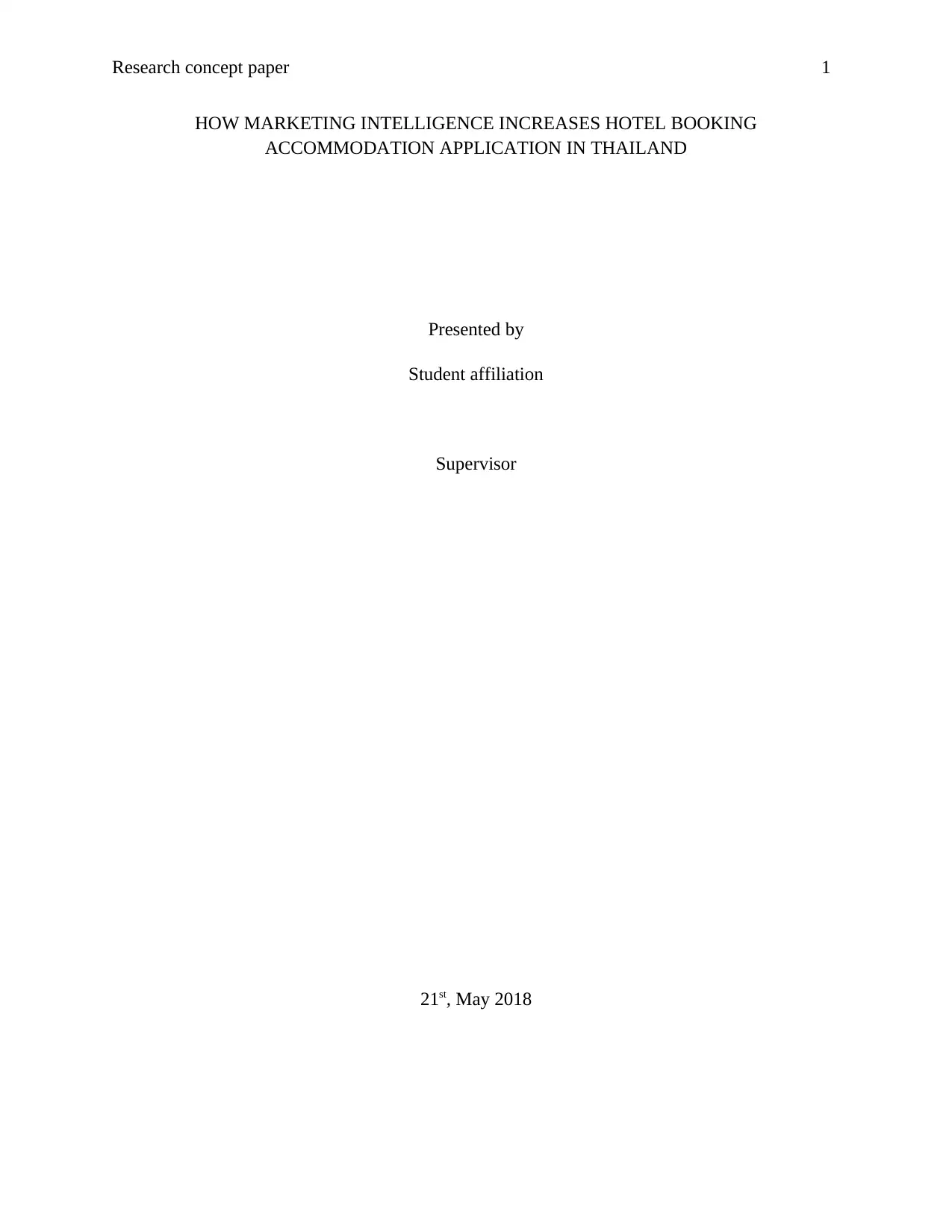
Research concept paper 1
HOW MARKETING INTELLIGENCE INCREASES HOTEL BOOKING
ACCOMMODATION APPLICATION IN THAILAND
Presented by
Student affiliation
Supervisor
21st, May 2018
HOW MARKETING INTELLIGENCE INCREASES HOTEL BOOKING
ACCOMMODATION APPLICATION IN THAILAND
Presented by
Student affiliation
Supervisor
21st, May 2018
Secure Best Marks with AI Grader
Need help grading? Try our AI Grader for instant feedback on your assignments.
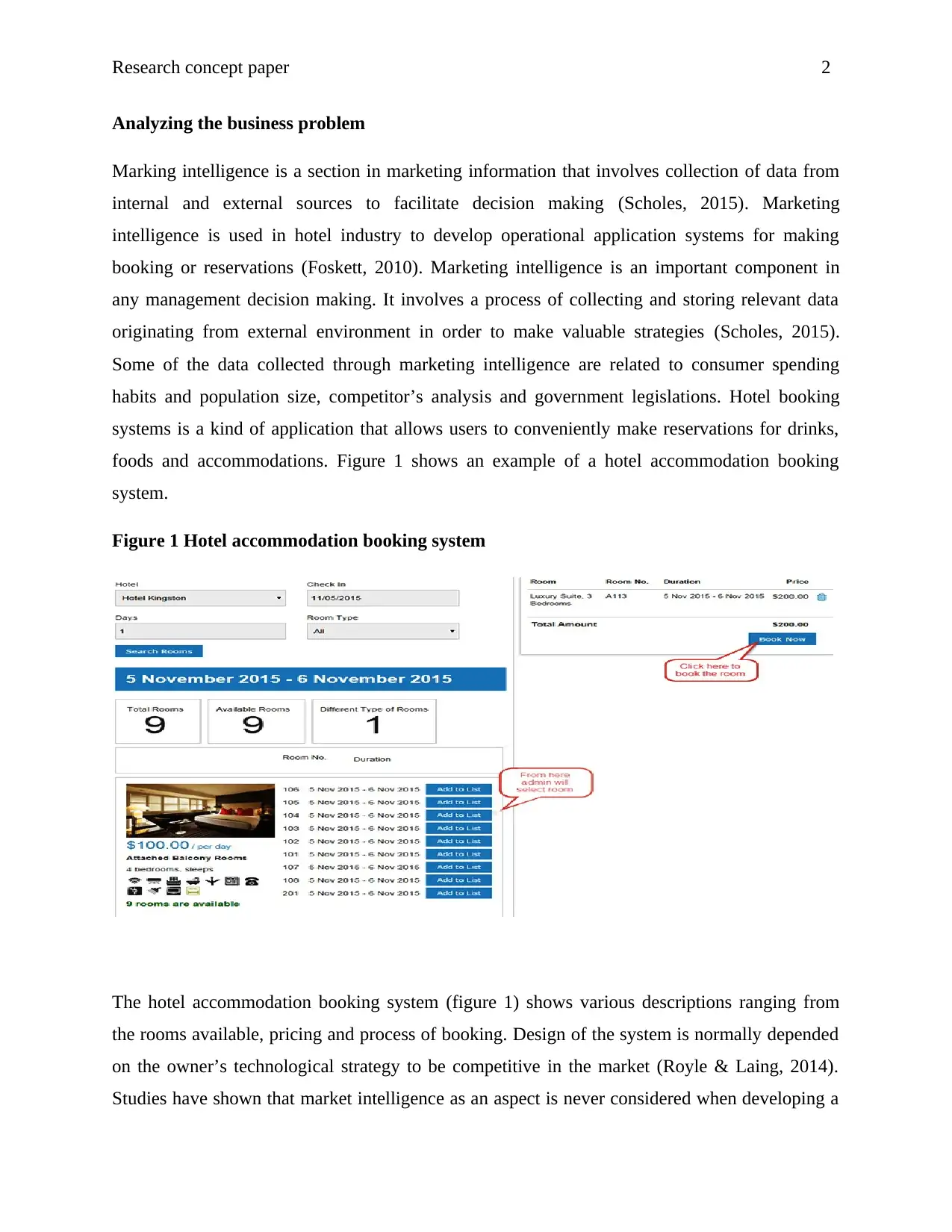
Research concept paper 2
Analyzing the business problem
Marking intelligence is a section in marketing information that involves collection of data from
internal and external sources to facilitate decision making (Scholes, 2015). Marketing
intelligence is used in hotel industry to develop operational application systems for making
booking or reservations (Foskett, 2010). Marketing intelligence is an important component in
any management decision making. It involves a process of collecting and storing relevant data
originating from external environment in order to make valuable strategies (Scholes, 2015).
Some of the data collected through marketing intelligence are related to consumer spending
habits and population size, competitor’s analysis and government legislations. Hotel booking
systems is a kind of application that allows users to conveniently make reservations for drinks,
foods and accommodations. Figure 1 shows an example of a hotel accommodation booking
system.
Figure 1 Hotel accommodation booking system
The hotel accommodation booking system (figure 1) shows various descriptions ranging from
the rooms available, pricing and process of booking. Design of the system is normally depended
on the owner’s technological strategy to be competitive in the market (Royle & Laing, 2014).
Studies have shown that market intelligence as an aspect is never considered when developing a
Analyzing the business problem
Marking intelligence is a section in marketing information that involves collection of data from
internal and external sources to facilitate decision making (Scholes, 2015). Marketing
intelligence is used in hotel industry to develop operational application systems for making
booking or reservations (Foskett, 2010). Marketing intelligence is an important component in
any management decision making. It involves a process of collecting and storing relevant data
originating from external environment in order to make valuable strategies (Scholes, 2015).
Some of the data collected through marketing intelligence are related to consumer spending
habits and population size, competitor’s analysis and government legislations. Hotel booking
systems is a kind of application that allows users to conveniently make reservations for drinks,
foods and accommodations. Figure 1 shows an example of a hotel accommodation booking
system.
Figure 1 Hotel accommodation booking system
The hotel accommodation booking system (figure 1) shows various descriptions ranging from
the rooms available, pricing and process of booking. Design of the system is normally depended
on the owner’s technological strategy to be competitive in the market (Royle & Laing, 2014).
Studies have shown that market intelligence as an aspect is never considered when developing a
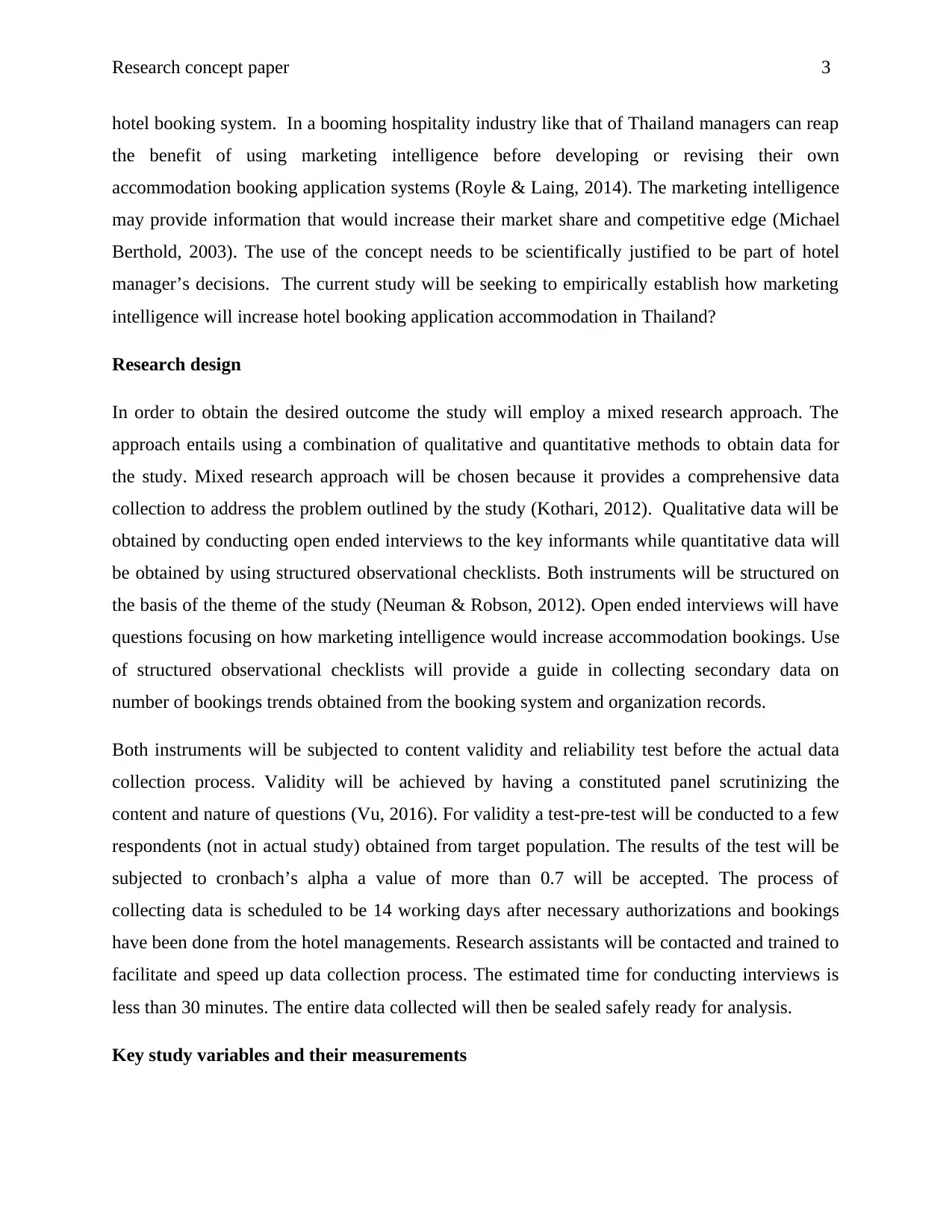
Research concept paper 3
hotel booking system. In a booming hospitality industry like that of Thailand managers can reap
the benefit of using marketing intelligence before developing or revising their own
accommodation booking application systems (Royle & Laing, 2014). The marketing intelligence
may provide information that would increase their market share and competitive edge (Michael
Berthold, 2003). The use of the concept needs to be scientifically justified to be part of hotel
manager’s decisions. The current study will be seeking to empirically establish how marketing
intelligence will increase hotel booking application accommodation in Thailand?
Research design
In order to obtain the desired outcome the study will employ a mixed research approach. The
approach entails using a combination of qualitative and quantitative methods to obtain data for
the study. Mixed research approach will be chosen because it provides a comprehensive data
collection to address the problem outlined by the study (Kothari, 2012). Qualitative data will be
obtained by conducting open ended interviews to the key informants while quantitative data will
be obtained by using structured observational checklists. Both instruments will be structured on
the basis of the theme of the study (Neuman & Robson, 2012). Open ended interviews will have
questions focusing on how marketing intelligence would increase accommodation bookings. Use
of structured observational checklists will provide a guide in collecting secondary data on
number of bookings trends obtained from the booking system and organization records.
Both instruments will be subjected to content validity and reliability test before the actual data
collection process. Validity will be achieved by having a constituted panel scrutinizing the
content and nature of questions (Vu, 2016). For validity a test-pre-test will be conducted to a few
respondents (not in actual study) obtained from target population. The results of the test will be
subjected to cronbach’s alpha a value of more than 0.7 will be accepted. The process of
collecting data is scheduled to be 14 working days after necessary authorizations and bookings
have been done from the hotel managements. Research assistants will be contacted and trained to
facilitate and speed up data collection process. The estimated time for conducting interviews is
less than 30 minutes. The entire data collected will then be sealed safely ready for analysis.
Key study variables and their measurements
hotel booking system. In a booming hospitality industry like that of Thailand managers can reap
the benefit of using marketing intelligence before developing or revising their own
accommodation booking application systems (Royle & Laing, 2014). The marketing intelligence
may provide information that would increase their market share and competitive edge (Michael
Berthold, 2003). The use of the concept needs to be scientifically justified to be part of hotel
manager’s decisions. The current study will be seeking to empirically establish how marketing
intelligence will increase hotel booking application accommodation in Thailand?
Research design
In order to obtain the desired outcome the study will employ a mixed research approach. The
approach entails using a combination of qualitative and quantitative methods to obtain data for
the study. Mixed research approach will be chosen because it provides a comprehensive data
collection to address the problem outlined by the study (Kothari, 2012). Qualitative data will be
obtained by conducting open ended interviews to the key informants while quantitative data will
be obtained by using structured observational checklists. Both instruments will be structured on
the basis of the theme of the study (Neuman & Robson, 2012). Open ended interviews will have
questions focusing on how marketing intelligence would increase accommodation bookings. Use
of structured observational checklists will provide a guide in collecting secondary data on
number of bookings trends obtained from the booking system and organization records.
Both instruments will be subjected to content validity and reliability test before the actual data
collection process. Validity will be achieved by having a constituted panel scrutinizing the
content and nature of questions (Vu, 2016). For validity a test-pre-test will be conducted to a few
respondents (not in actual study) obtained from target population. The results of the test will be
subjected to cronbach’s alpha a value of more than 0.7 will be accepted. The process of
collecting data is scheduled to be 14 working days after necessary authorizations and bookings
have been done from the hotel managements. Research assistants will be contacted and trained to
facilitate and speed up data collection process. The estimated time for conducting interviews is
less than 30 minutes. The entire data collected will then be sealed safely ready for analysis.
Key study variables and their measurements
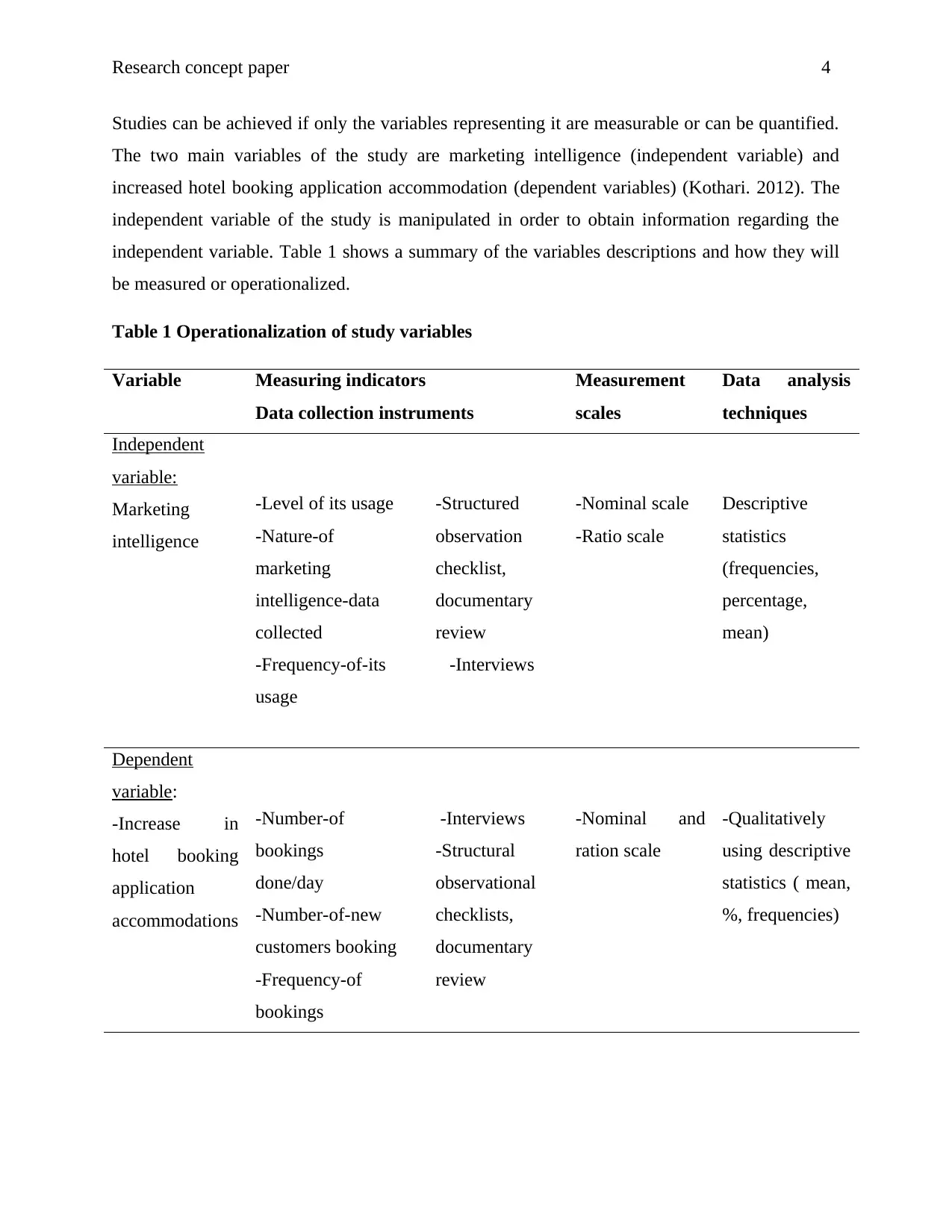
Research concept paper 4
Studies can be achieved if only the variables representing it are measurable or can be quantified.
The two main variables of the study are marketing intelligence (independent variable) and
increased hotel booking application accommodation (dependent variables) (Kothari. 2012). The
independent variable of the study is manipulated in order to obtain information regarding the
independent variable. Table 1 shows a summary of the variables descriptions and how they will
be measured or operationalized.
Table 1 Operationalization of study variables
Variable Measuring indicators
Data collection instruments
Measurement
scales
Data analysis
techniques
Independent
variable:
Marketing
intelligence
-Level of its usage
-Nature-of
marketing
intelligence-data
collected
-Frequency-of-its
usage
-Structured
observation
checklist,
documentary
review
-Interviews
-Nominal scale
-Ratio scale
Descriptive
statistics
(frequencies,
percentage,
mean)
Dependent
variable:
-Increase in
hotel booking
application
accommodations
-Number-of
bookings
done/day
-Number-of-new
customers booking
-Frequency-of
bookings
-Interviews
-Structural
observational
checklists,
documentary
review
-Nominal and
ration scale
-Qualitatively
using descriptive
statistics ( mean,
%, frequencies)
Studies can be achieved if only the variables representing it are measurable or can be quantified.
The two main variables of the study are marketing intelligence (independent variable) and
increased hotel booking application accommodation (dependent variables) (Kothari. 2012). The
independent variable of the study is manipulated in order to obtain information regarding the
independent variable. Table 1 shows a summary of the variables descriptions and how they will
be measured or operationalized.
Table 1 Operationalization of study variables
Variable Measuring indicators
Data collection instruments
Measurement
scales
Data analysis
techniques
Independent
variable:
Marketing
intelligence
-Level of its usage
-Nature-of
marketing
intelligence-data
collected
-Frequency-of-its
usage
-Structured
observation
checklist,
documentary
review
-Interviews
-Nominal scale
-Ratio scale
Descriptive
statistics
(frequencies,
percentage,
mean)
Dependent
variable:
-Increase in
hotel booking
application
accommodations
-Number-of
bookings
done/day
-Number-of-new
customers booking
-Frequency-of
bookings
-Interviews
-Structural
observational
checklists,
documentary
review
-Nominal and
ration scale
-Qualitatively
using descriptive
statistics ( mean,
%, frequencies)
Secure Best Marks with AI Grader
Need help grading? Try our AI Grader for instant feedback on your assignments.
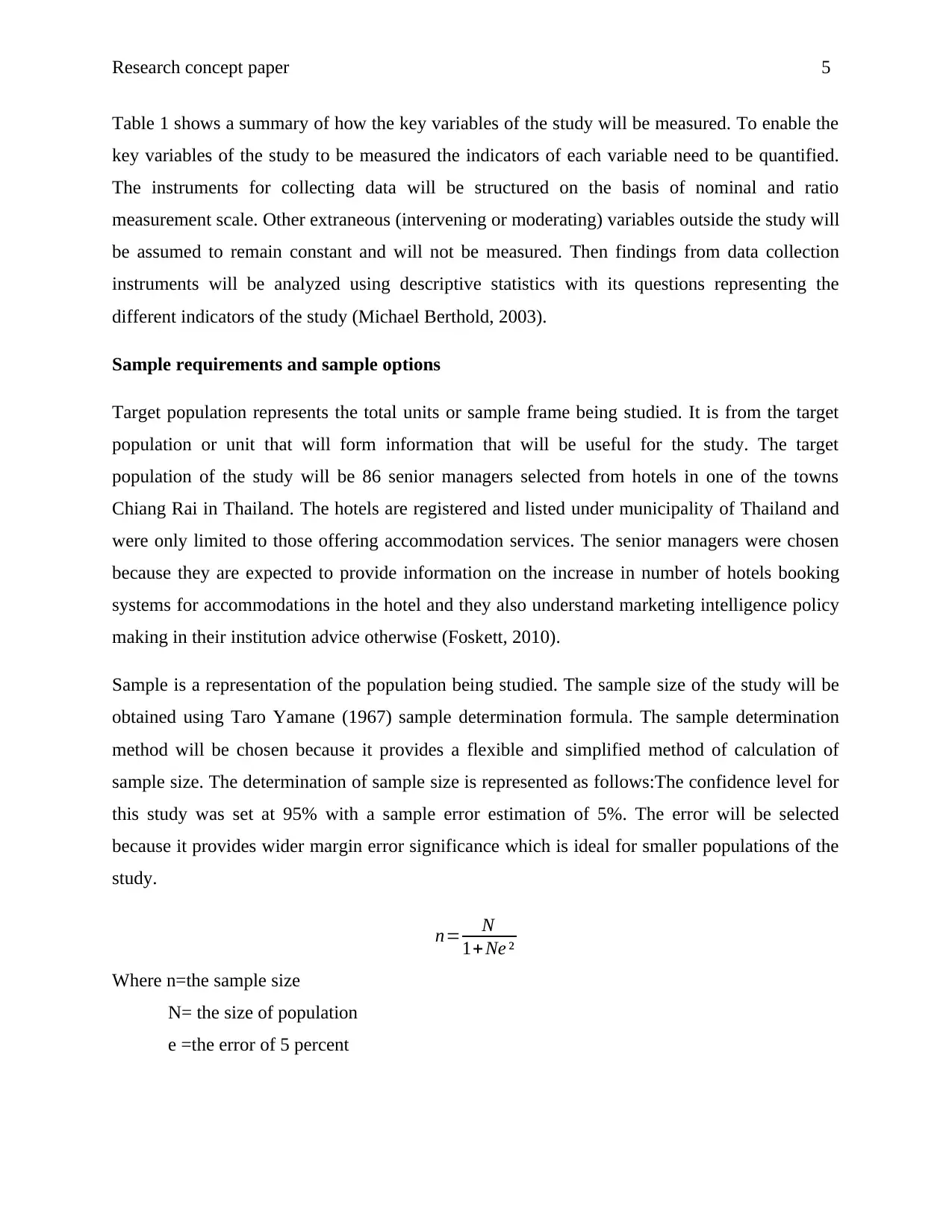
Research concept paper 5
Table 1 shows a summary of how the key variables of the study will be measured. To enable the
key variables of the study to be measured the indicators of each variable need to be quantified.
The instruments for collecting data will be structured on the basis of nominal and ratio
measurement scale. Other extraneous (intervening or moderating) variables outside the study will
be assumed to remain constant and will not be measured. Then findings from data collection
instruments will be analyzed using descriptive statistics with its questions representing the
different indicators of the study (Michael Berthold, 2003).
Sample requirements and sample options
Target population represents the total units or sample frame being studied. It is from the target
population or unit that will form information that will be useful for the study. The target
population of the study will be 86 senior managers selected from hotels in one of the towns
Chiang Rai in Thailand. The hotels are registered and listed under municipality of Thailand and
were only limited to those offering accommodation services. The senior managers were chosen
because they are expected to provide information on the increase in number of hotels booking
systems for accommodations in the hotel and they also understand marketing intelligence policy
making in their institution advice otherwise (Foskett, 2010).
Sample is a representation of the population being studied. The sample size of the study will be
obtained using Taro Yamane (1967) sample determination formula. The sample determination
method will be chosen because it provides a flexible and simplified method of calculation of
sample size. The determination of sample size is represented as follows:The confidence level for
this study was set at 95% with a sample error estimation of 5%. The error will be selected
because it provides wider margin error significance which is ideal for smaller populations of the
study.
n= N
1+ Ne ²
Where n=the sample size
N= the size of population
e =the error of 5 percent
Table 1 shows a summary of how the key variables of the study will be measured. To enable the
key variables of the study to be measured the indicators of each variable need to be quantified.
The instruments for collecting data will be structured on the basis of nominal and ratio
measurement scale. Other extraneous (intervening or moderating) variables outside the study will
be assumed to remain constant and will not be measured. Then findings from data collection
instruments will be analyzed using descriptive statistics with its questions representing the
different indicators of the study (Michael Berthold, 2003).
Sample requirements and sample options
Target population represents the total units or sample frame being studied. It is from the target
population or unit that will form information that will be useful for the study. The target
population of the study will be 86 senior managers selected from hotels in one of the towns
Chiang Rai in Thailand. The hotels are registered and listed under municipality of Thailand and
were only limited to those offering accommodation services. The senior managers were chosen
because they are expected to provide information on the increase in number of hotels booking
systems for accommodations in the hotel and they also understand marketing intelligence policy
making in their institution advice otherwise (Foskett, 2010).
Sample is a representation of the population being studied. The sample size of the study will be
obtained using Taro Yamane (1967) sample determination formula. The sample determination
method will be chosen because it provides a flexible and simplified method of calculation of
sample size. The determination of sample size is represented as follows:The confidence level for
this study was set at 95% with a sample error estimation of 5%. The error will be selected
because it provides wider margin error significance which is ideal for smaller populations of the
study.
n= N
1+ Ne ²
Where n=the sample size
N= the size of population
e =the error of 5 percent
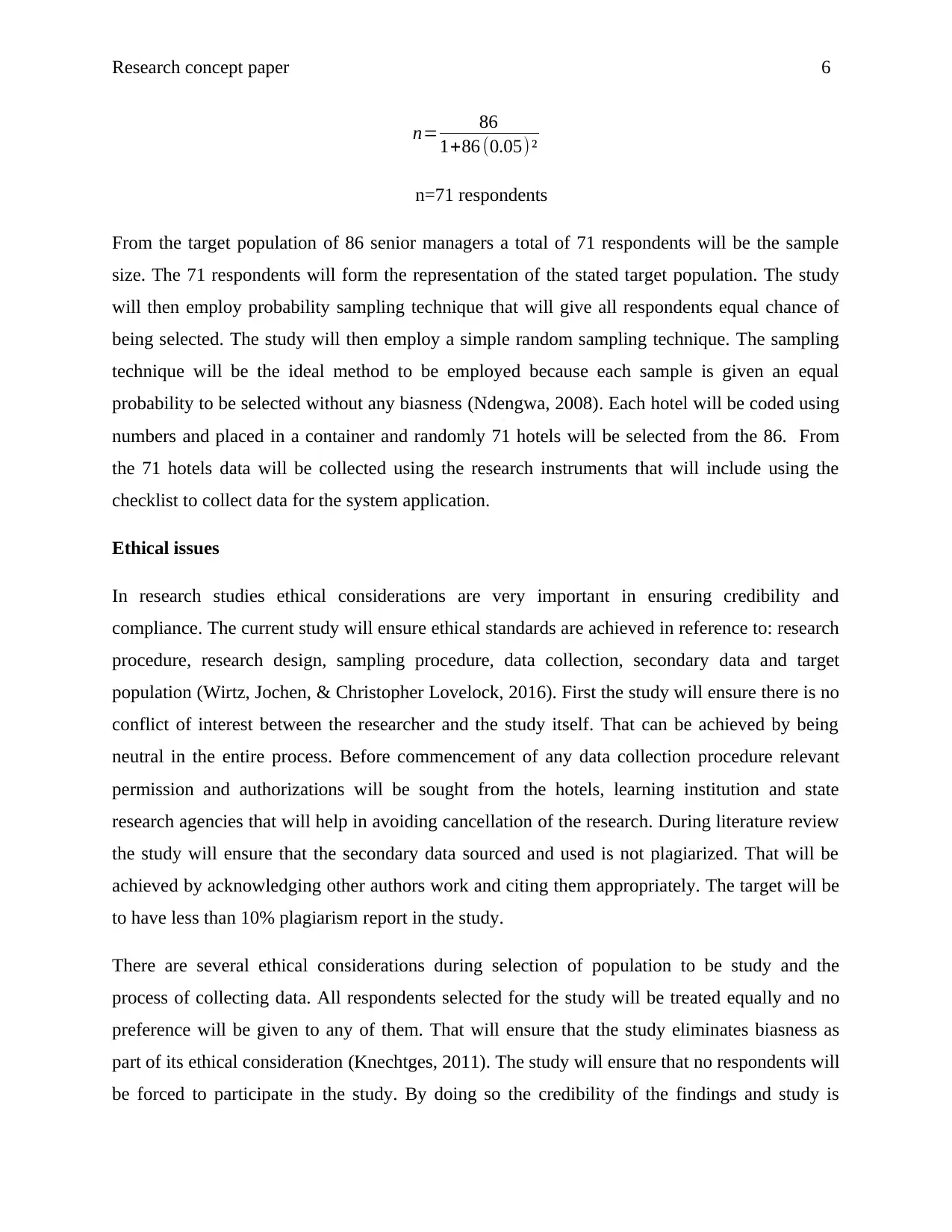
Research concept paper 6
n= 86
1+86 (0.05)²
n=71 respondents
From the target population of 86 senior managers a total of 71 respondents will be the sample
size. The 71 respondents will form the representation of the stated target population. The study
will then employ probability sampling technique that will give all respondents equal chance of
being selected. The study will then employ a simple random sampling technique. The sampling
technique will be the ideal method to be employed because each sample is given an equal
probability to be selected without any biasness (Ndengwa, 2008). Each hotel will be coded using
numbers and placed in a container and randomly 71 hotels will be selected from the 86. From
the 71 hotels data will be collected using the research instruments that will include using the
checklist to collect data for the system application.
Ethical issues
In research studies ethical considerations are very important in ensuring credibility and
compliance. The current study will ensure ethical standards are achieved in reference to: research
procedure, research design, sampling procedure, data collection, secondary data and target
population (Wirtz, Jochen, & Christopher Lovelock, 2016). First the study will ensure there is no
conflict of interest between the researcher and the study itself. That can be achieved by being
neutral in the entire process. Before commencement of any data collection procedure relevant
permission and authorizations will be sought from the hotels, learning institution and state
research agencies that will help in avoiding cancellation of the research. During literature review
the study will ensure that the secondary data sourced and used is not plagiarized. That will be
achieved by acknowledging other authors work and citing them appropriately. The target will be
to have less than 10% plagiarism report in the study.
There are several ethical considerations during selection of population to be study and the
process of collecting data. All respondents selected for the study will be treated equally and no
preference will be given to any of them. That will ensure that the study eliminates biasness as
part of its ethical consideration (Knechtges, 2011). The study will ensure that no respondents will
be forced to participate in the study. By doing so the credibility of the findings and study is
n= 86
1+86 (0.05)²
n=71 respondents
From the target population of 86 senior managers a total of 71 respondents will be the sample
size. The 71 respondents will form the representation of the stated target population. The study
will then employ probability sampling technique that will give all respondents equal chance of
being selected. The study will then employ a simple random sampling technique. The sampling
technique will be the ideal method to be employed because each sample is given an equal
probability to be selected without any biasness (Ndengwa, 2008). Each hotel will be coded using
numbers and placed in a container and randomly 71 hotels will be selected from the 86. From
the 71 hotels data will be collected using the research instruments that will include using the
checklist to collect data for the system application.
Ethical issues
In research studies ethical considerations are very important in ensuring credibility and
compliance. The current study will ensure ethical standards are achieved in reference to: research
procedure, research design, sampling procedure, data collection, secondary data and target
population (Wirtz, Jochen, & Christopher Lovelock, 2016). First the study will ensure there is no
conflict of interest between the researcher and the study itself. That can be achieved by being
neutral in the entire process. Before commencement of any data collection procedure relevant
permission and authorizations will be sought from the hotels, learning institution and state
research agencies that will help in avoiding cancellation of the research. During literature review
the study will ensure that the secondary data sourced and used is not plagiarized. That will be
achieved by acknowledging other authors work and citing them appropriately. The target will be
to have less than 10% plagiarism report in the study.
There are several ethical considerations during selection of population to be study and the
process of collecting data. All respondents selected for the study will be treated equally and no
preference will be given to any of them. That will ensure that the study eliminates biasness as
part of its ethical consideration (Knechtges, 2011). The study will ensure that no respondents will
be forced to participate in the study. By doing so the credibility of the findings and study is
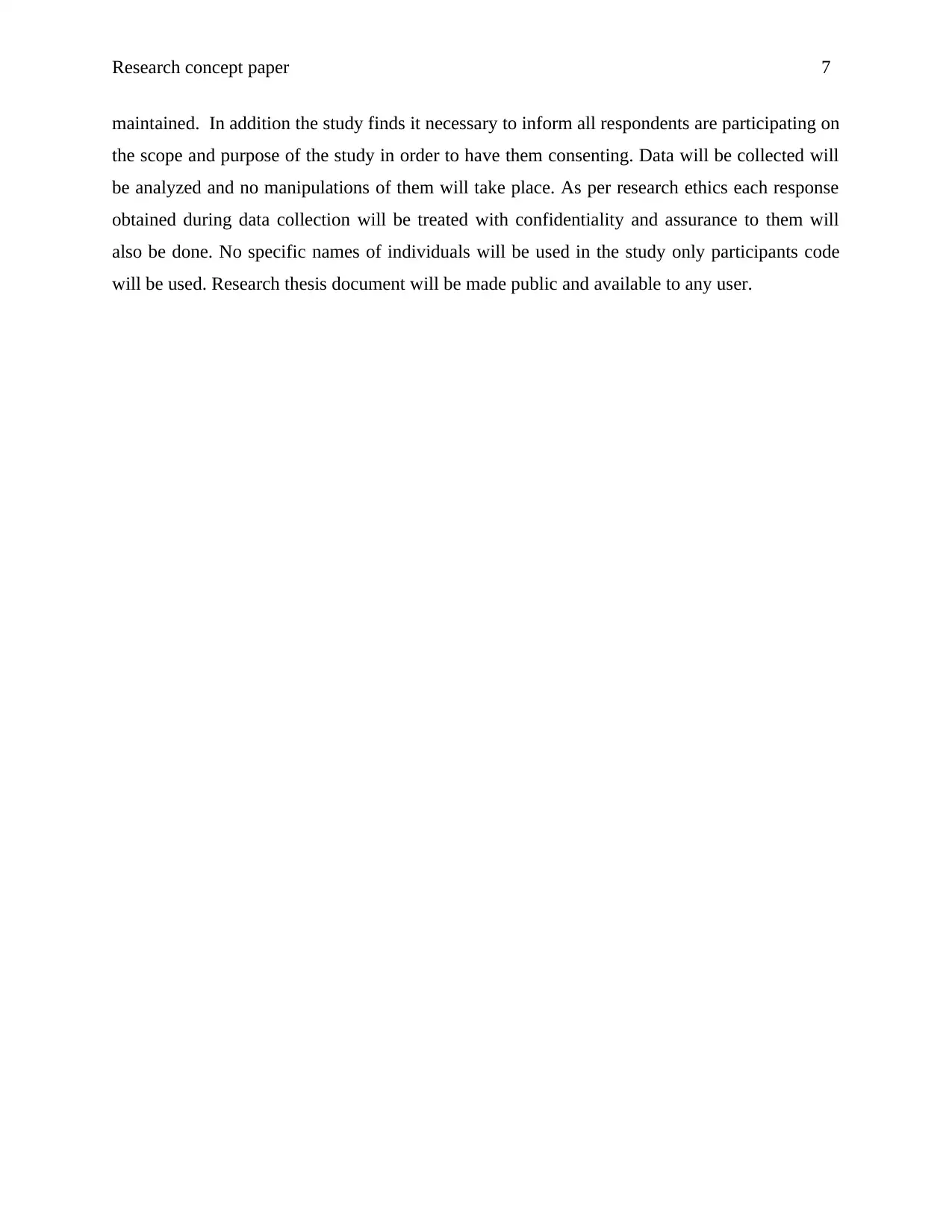
Research concept paper 7
maintained. In addition the study finds it necessary to inform all respondents are participating on
the scope and purpose of the study in order to have them consenting. Data will be collected will
be analyzed and no manipulations of them will take place. As per research ethics each response
obtained during data collection will be treated with confidentiality and assurance to them will
also be done. No specific names of individuals will be used in the study only participants code
will be used. Research thesis document will be made public and available to any user.
maintained. In addition the study finds it necessary to inform all respondents are participating on
the scope and purpose of the study in order to have them consenting. Data will be collected will
be analyzed and no manipulations of them will take place. As per research ethics each response
obtained during data collection will be treated with confidentiality and assurance to them will
also be done. No specific names of individuals will be used in the study only participants code
will be used. Research thesis document will be made public and available to any user.
Paraphrase This Document
Need a fresh take? Get an instant paraphrase of this document with our AI Paraphraser
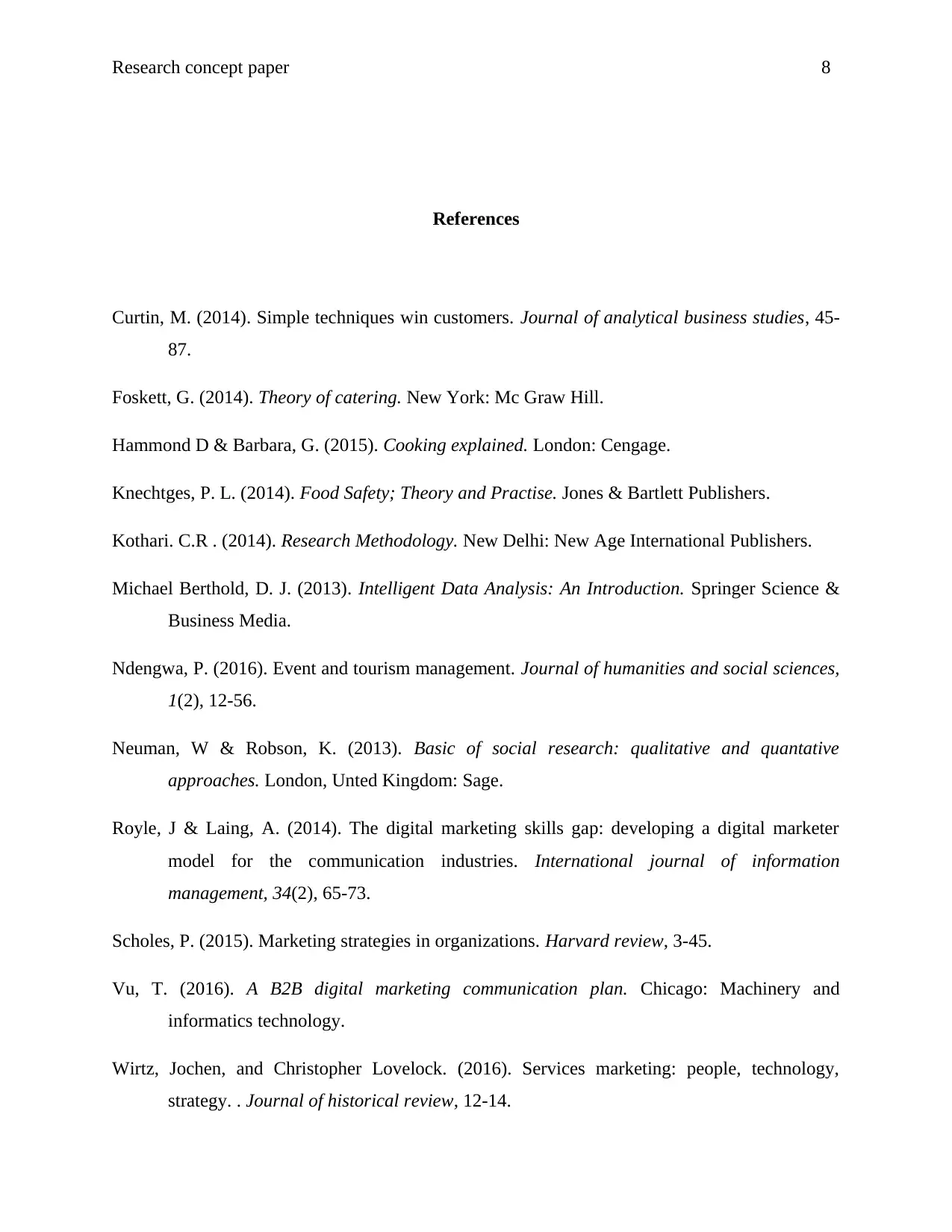
Research concept paper 8
References
Curtin, M. (2014). Simple techniques win customers. Journal of analytical business studies, 45-
87.
Foskett, G. (2014). Theory of catering. New York: Mc Graw Hill.
Hammond D & Barbara, G. (2015). Cooking explained. London: Cengage.
Knechtges, P. L. (2014). Food Safety; Theory and Practise. Jones & Bartlett Publishers.
Kothari. C.R . (2014). Research Methodology. New Delhi: New Age International Publishers.
Michael Berthold, D. J. (2013). Intelligent Data Analysis: An Introduction. Springer Science &
Business Media.
Ndengwa, P. (2016). Event and tourism management. Journal of humanities and social sciences,
1(2), 12-56.
Neuman, W & Robson, K. (2013). Basic of social research: qualitative and quantative
approaches. London, Unted Kingdom: Sage.
Royle, J & Laing, A. (2014). The digital marketing skills gap: developing a digital marketer
model for the communication industries. International journal of information
management, 34(2), 65-73.
Scholes, P. (2015). Marketing strategies in organizations. Harvard review, 3-45.
Vu, T. (2016). A B2B digital marketing communication plan. Chicago: Machinery and
informatics technology.
Wirtz, Jochen, and Christopher Lovelock. (2016). Services marketing: people, technology,
strategy. . Journal of historical review, 12-14.
References
Curtin, M. (2014). Simple techniques win customers. Journal of analytical business studies, 45-
87.
Foskett, G. (2014). Theory of catering. New York: Mc Graw Hill.
Hammond D & Barbara, G. (2015). Cooking explained. London: Cengage.
Knechtges, P. L. (2014). Food Safety; Theory and Practise. Jones & Bartlett Publishers.
Kothari. C.R . (2014). Research Methodology. New Delhi: New Age International Publishers.
Michael Berthold, D. J. (2013). Intelligent Data Analysis: An Introduction. Springer Science &
Business Media.
Ndengwa, P. (2016). Event and tourism management. Journal of humanities and social sciences,
1(2), 12-56.
Neuman, W & Robson, K. (2013). Basic of social research: qualitative and quantative
approaches. London, Unted Kingdom: Sage.
Royle, J & Laing, A. (2014). The digital marketing skills gap: developing a digital marketer
model for the communication industries. International journal of information
management, 34(2), 65-73.
Scholes, P. (2015). Marketing strategies in organizations. Harvard review, 3-45.
Vu, T. (2016). A B2B digital marketing communication plan. Chicago: Machinery and
informatics technology.
Wirtz, Jochen, and Christopher Lovelock. (2016). Services marketing: people, technology,
strategy. . Journal of historical review, 12-14.

Research concept paper 9
1 out of 9
Related Documents
Your All-in-One AI-Powered Toolkit for Academic Success.
+13062052269
info@desklib.com
Available 24*7 on WhatsApp / Email
![[object Object]](/_next/static/media/star-bottom.7253800d.svg)
Unlock your academic potential
© 2024 | Zucol Services PVT LTD | All rights reserved.



